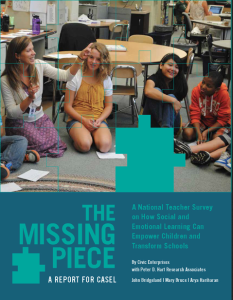 "From the schoolhouse to State House, 'academic skills' have been emphasized, tested, and reported upon, but another essential aspect of a child’s education — social and emotional learning (SEL) — has been underemphasized or altogether forgotten — with serious consequences to children, schools, and communities," write Jennifer Buffett, member of the Collaborative for Academic, Social, and Emotional Learning (CASEL) Board of Directors and NoVo Foundation President and Co-Chair, and Timothy Shriver, CASEL Board of Directors Chair and Special Olympics CEO, in an open letter to the American people.
"From the schoolhouse to State House, 'academic skills' have been emphasized, tested, and reported upon, but another essential aspect of a child’s education — social and emotional learning (SEL) — has been underemphasized or altogether forgotten — with serious consequences to children, schools, and communities," write Jennifer Buffett, member of the Collaborative for Academic, Social, and Emotional Learning (CASEL) Board of Directors and NoVo Foundation President and Co-Chair, and Timothy Shriver, CASEL Board of Directors Chair and Special Olympics CEO, in an open letter to the American people.
This letter appears at the beginning of a report released last month called "The Missing Piece: A National Teacher Survey on How Social and Emotional Learning Can Empower Children and Transform Schools," co-authored by John Bridgeland, Mary Bruce, and Arya Hariharan of Civic Enterprises with Peter D. Hart Research Associates.
A news release by CASEL explains that the report outlines the survey’s findings along three major themes:
- Teachers understand, value and endorse social and emotional learning for all students. Nearly all teachers, 93 percent in the survey, believe SEL is “very” or “fairly” important for the in-school student experience. Even more, 95 percent, believe that social and emotional skills are teachable, and 87 percent report that SEL benefits students from all backgrounds, rich and poor. Further, more than three quarters of teachers believe a larger focus on SEL will be a major benefit to students because of positive effects on workforce readiness (87 percent), school attendance and graduation (80 percent), life success (87 percent), college preparation (78 percent) and academic success (75 percent).
- Teachers believe social and emotional learning helps students achieve in school and life. Eight of 10 teachers think SEL will have a major benefit on students’ ability to stay on track and graduate, and will increase standardized test scores and overall academic performance (77 percent). At least three quarters of teachers believe SEL will improve student academic achievement and performance.
- Teachers identify key accelerators for social and emotional learning. Two of three teachers (62 percent) think the development of social and emotional skills should be explicitly stated in their state education standards. Teachers across grade levels, and their students’ household income levels, share this sentiment: More than half of teachers in prekindergarten and elementary schools (65 percent), middle schools (64 percent) and high schools (55 percent), and more than half of teachers in high-poverty (68 percent) and low-poverty (59 percent) schools want SEL in their state standards.
SEL is defined in the report as including five competency areas:
- Self-awareness: The ability to accurately recognize one’s emotions and thoughts and their influence on behavior. This includes accurately assessing one’s strengths and limitations and having a well-grounded sense of confidence and optimism.
- Self-management: The ability to regulate one’s emotions, thoughts, and behaviors effectively in different situations. This includes managing stress, controlling impulses, motivating oneself, and setting and working toward personal and academic goals.
- Social awareness: The ability to take the perspective of and empathize with others from diverse backgrounds and cultures; to understand social and ethical norms for behavior; and to recognize family, school, and community resources and supports.
- Relationship skills: The ability to establish and maintain healthy and rewarding relationships with diverse individuals and groups. This includes communicating clearly, listening actively, cooperating, resisting inappropriate social pressure, negotiating conflict constructively, and seeking and offering help when needed.
- Responsible decision-making: The ability to make constructive and respectful choices about personal behavior and social interactions based on consideration of ethical standards, safety concerns, social norms, the realistic evaluation of consequences of various actions, and the well-being of self and others. (p. 9)
Read The Missing Piece.
